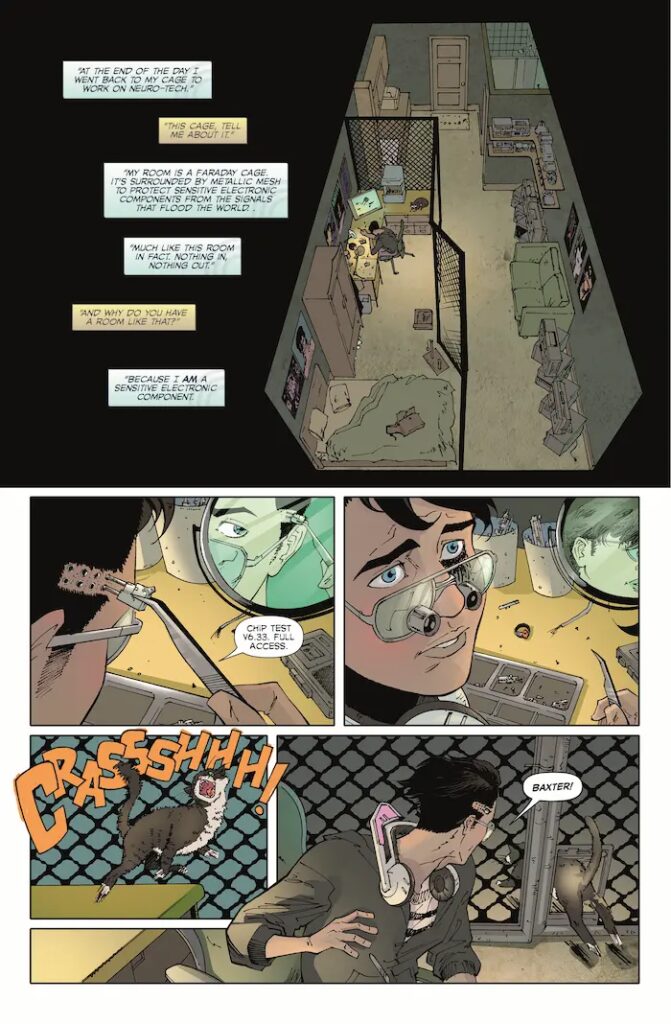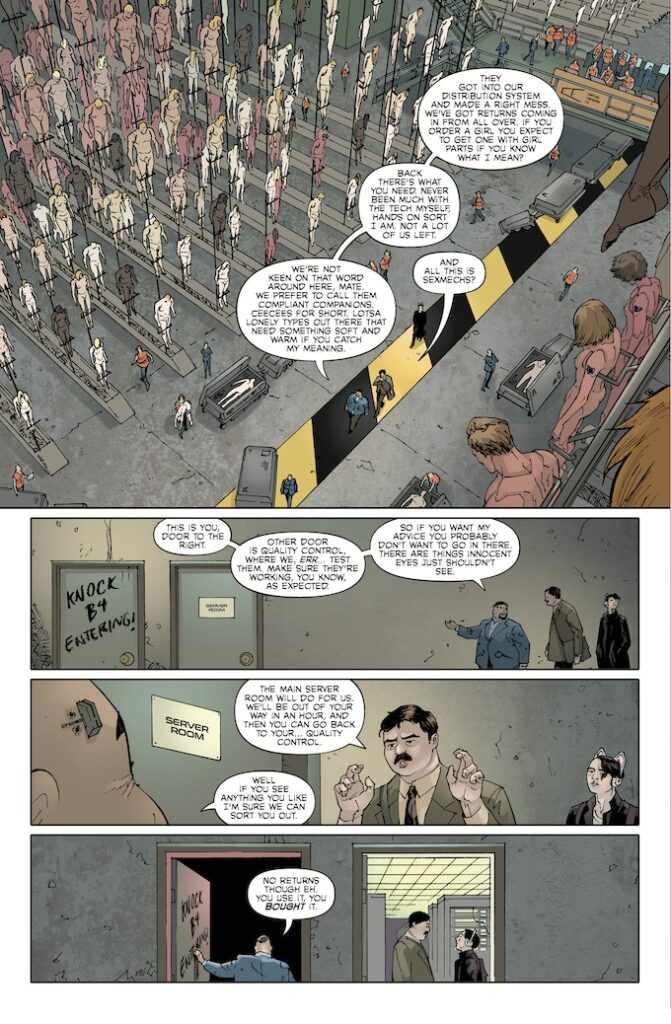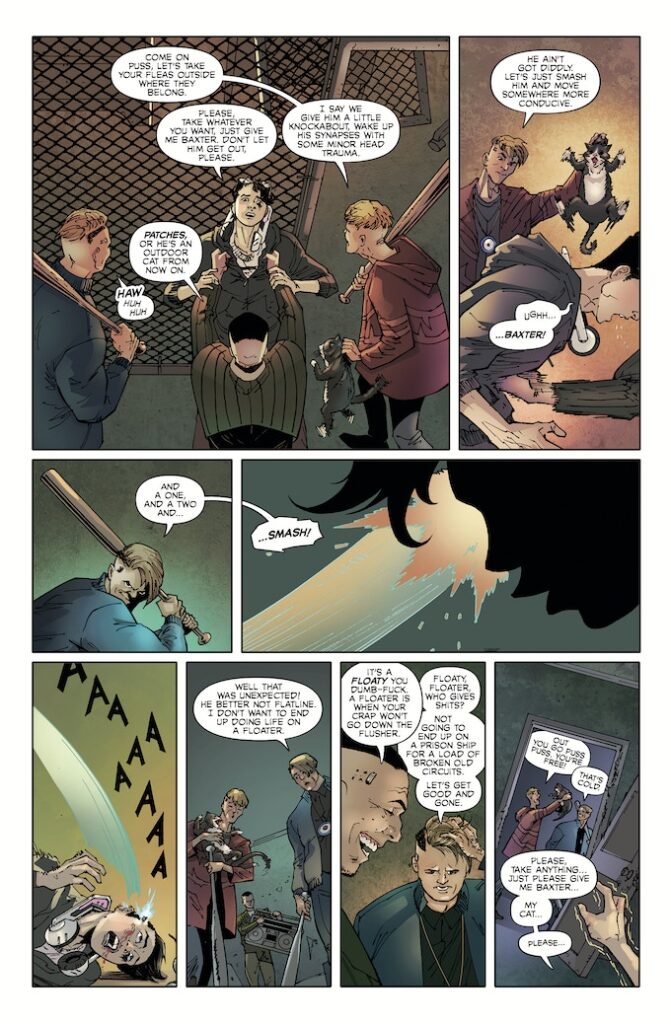Writer: David Wilburn
Artist: Rafael Romeo Magat
Broken Face Comics, November 2023
For a waypoint of the genre of science, cyberpunk was brief, inherently doomed to obsolescence but its very nature. Near-visions of the future are quickly overtaken by reality. But cyberpunk has benefited from a relatively recent 1980s nostalgia revival, in pop culture fuelled by the online game, Cyberpunk 2077. This new title, The Ghost System, written by David Wilburn and with art by Rafael Romeo Magut, is firmly hitched to that revival.

Cyberpunk fiction must include the usual indicia of a shocking hardwiring biology, and if the creators are clever, something new. There is no sanctity of the body in cyberpunk. Brains are rewired with ports to accept upgrades and additional skills, bodies are radically altered for combat or no purpose other than aesthetic shock (2000 AD’s Judge Dredd; Mobius and Jodorowsky’s The Incal,) whether they be human or animal (Paul Pope’s Batman Year 100).
Shady artificial intelligences and their human puppets (Marvel Comics’ malevolent robot Ultron, the X-Men’s Nimrod) are a common theme in cyberpunk. And sometimes we see a borderline or actual dystopia with corporations taking the place of government, providing a predatory landscape for self-aware software (Frank Miller’s Ronin).
Some mainstream comic book characters are cyberpunk in their origins, notably Marvel Comics’ Cable, and DC Comics’ characters Midnighter and the Engineer. Image Comics has an entire group of cyberpunk superheroes, Cyberforce, consisting of characters with robot limbs. We have otherwise discussed cyberpunk at length in this review: https://www.worldcomicbookreview.com/2019/03/18/drugs-and-wires-down-in-a-hole-review-volume-1/ back in 2019, and here: https://www.worldcomicbookreview.com/2017/06/28/midnight-task-force-1-review/ in 2018 before we realised it was undergoing a renaissance.
(Why is Ultron in this list? The terrifying fusion of Ultron and the dead body its inventor, Hank Pym, as seen in Uncanny Avengers vol. 3 #9-10, is clearly recognisable as deep cyberpunk.)
Creators David Wilburn and Rafael Romeo Magat fulfil the brief with The Ghost System, and as an independent publication can go beyond what a mainstream comic can do. Mass consumption of sex was a theme in the television series Westworld, and The Ghost System explores this with the same sense of horror with which we regard the immoral abuse of Westworld‘s hosts.

We also learn about “fleshmechs”, enslaved quasi-humans who clearly have no rights and who Mr Wilburn describes as nonetheless horribly aware of their endless destiny to serve without volition. And we see some classic evolution of language: “Don’t chipshame me, keyboy!”.
The story is set in Manchester 2045, and we are told early that the world is suffering from the effects of catastrophic climate change. We assume Manchester is ordinarily a cool place, in central England (your reviewer has never been north of Oxford) and a radio announcer notes that the day’s weather in the city will be “hot, hot, hot!” and that the city of Liverpool is the site of the “Liverpool Coastal Basin”. Rising sea levels will make this sort of preservation of society by infrastructure very commonplace by 2045, we expect.
The main character is Soro, a white hat hacker who works for a company called Prophesy Inc. Soro is the subject of a violent assault, which occurs while he is testing a prototype chip upon himself. Soro’s synapses are jarred, and the chip causes him to be to perceive and manipulate electromagnetic radiation. In this future world, where almost everyone is riddled with circuitry, artist Rafael Romeo Magat (whose work on this title is excellent – his perspectives can be grand or intimate as required) renders this as visible to Soro in the form blue waves of ordered energy. But Soro, devastated by the death of his cat, named Baxter, is no lime-green code-perceiving Christ-figure like Neo from The Matrix motion pictures. Soro is more a vengeful, post-modern demon, precisely the wrong person to be gifted with the ability to manipulate electromagnetism.
We enjoyed Soro’s characterisation. Soro is no hero. He is a loner with no friends other than Baxter, working in an unfulfilling job. We have a brief look at his teen years, where we learn that he is a gifted hacker but is capable of petty impulses against someone who he perceives as having wronged him. Being granted a parahuman superpower does not turn him into some promised saviour. Soro is not a nice young man. It is rare in cyberpunk for the villain to be the lead.

Those of us who grew up in the 1980s find it a little bizarre that something which is out-of-date is now back in vogue. The Ghost System continues, in an exemplary way, a niche tradition, that of fictional universes devoid of traditions.



